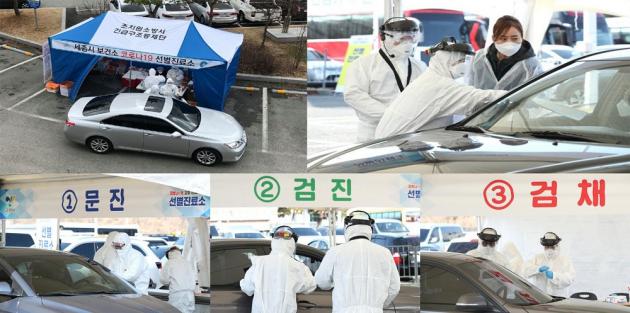Amid the rapid rise of people suspected of contracting the new coronavirus in Korea, drive-through testing facilities at local hospitals are drawing attention as a breakthrough to fight the deadly virus.
Such testing could prevent suspected patients from spreading the virus and protect healthcare workers.
As suspected patients stay in the car, the drive-through facility minimizes their contact with other people. After a sample collection, people with respiratory symptoms can go back home and remain isolated until they get the test results.

So far, hospitals used to spend over 30 minutes on collecting samples and disinfecting the isolation examination room. The drive-through sample collection, however, takes 10 minutes maximum, which includes a medical questionnaire, body temperature measurement, and sample collection.
Sejong City, 121 kilometers south from Seoul, and Goyang City in Gyeonggi Province, just northwest of Seoul, have become the first mover among local governments to introduce the drive-through COVID-19 testing.
On Wednesday, Goyang City started to operate a drive-through testing facility where a person with respiratory symptoms can receive a medical questionnaire, prescription, and sample collection inside the car.
The facility, located on the Jugyo No. 1 Public Parking Lot near the Goyang City Hall, runs from 10 a.m. to 5 p.m. until March 11.
Goyang City said it would consider adding drive-through screening facilities if necessary, after observing developments of the COVID-19 outbreak.
Sejong City also established a drive-through isolation examination room at the Sejong Public Health Center in Jochiwon town.
The idea of having a drive-through process at an isolation examination room came during a recent meeting of experts arranged by the ruling Democratic Party.
At the meeting, Ki Mo-ran, a professor at the National Cancer Center, said a screening facility in a remote space, such as a sports complex, could offer a drive-through coronavirus testing.
“This way, if suspected patients can wait for the results at home after sample collection, hospitals do not need to isolate them, and many people do not have to wait in line,” she said.
Myongji Hospital Chairman Lee Wang-jun also said, “The strongest weapon to fight the disease when there is no treatment is to conduct massive screening to separate risky patients early and make them stay at home to prevent the spread.”
The nation should open a massive screening center to collect a large number of samples, he added.

